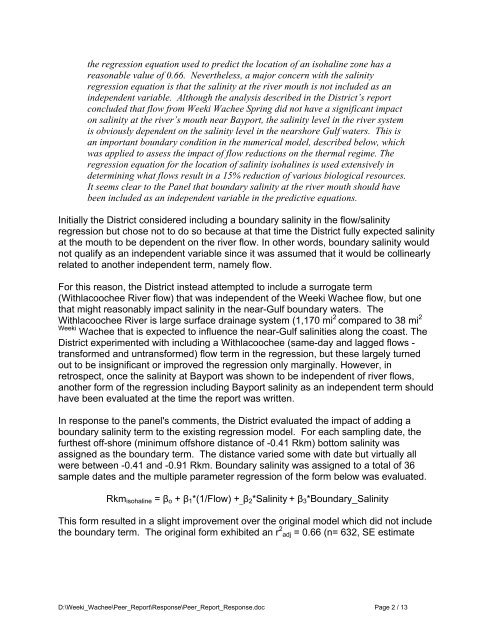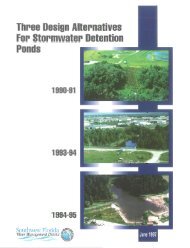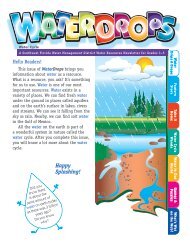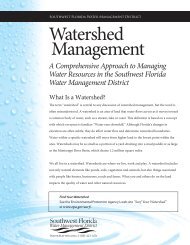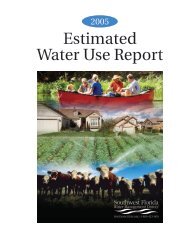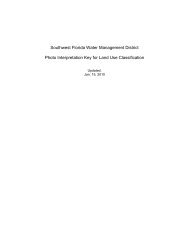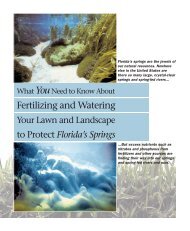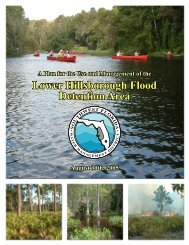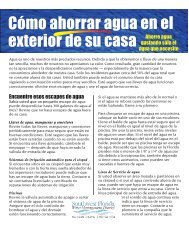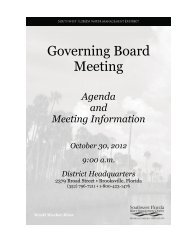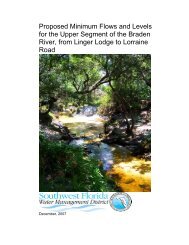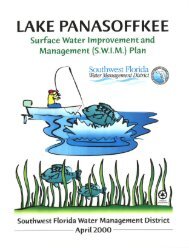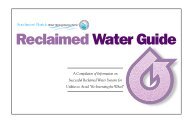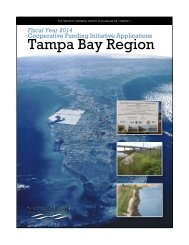Weeki Wachee River System Recommended Minimum Flows and ...
Weeki Wachee River System Recommended Minimum Flows and ...
Weeki Wachee River System Recommended Minimum Flows and ...
You also want an ePaper? Increase the reach of your titles
YUMPU automatically turns print PDFs into web optimized ePapers that Google loves.
the regression equation used to predict the location of an isohaline zone has a<br />
reasonable value of 0.66. Nevertheless, a major concern with the salinity<br />
regression equation is that the salinity at the river mouth is not included as an<br />
independent variable. Although the analysis described in the District’s report<br />
concluded that flow from <strong>Weeki</strong> <strong>Wachee</strong> Spring did not have a significant impact<br />
on salinity at the river’s mouth near Bayport, the salinity level in the river system<br />
is obviously dependent on the salinity level in the nearshore Gulf waters. This is<br />
an important boundary condition in the numerical model, described below, which<br />
was applied to assess the impact of flow reductions on the thermal regime. The<br />
regression equation for the location of salinity isohalines is used extensively in<br />
determining what flows result in a 15% reduction of various biological resources.<br />
It seems clear to the Panel that boundary salinity at the river mouth should have<br />
been included as an independent variable in the predictive equations.<br />
Initially the District considered including a boundary salinity in the flow/salinity<br />
regression but chose not to do so because at that time the District fully expected salinity<br />
at the mouth to be dependent on the river flow. In other words, boundary salinity would<br />
not qualify as an independent variable since it was assumed that it would be collinearly<br />
related to another independent term, namely flow.<br />
For this reason, the District instead attempted to include a surrogate term<br />
(Withlacoochee <strong>River</strong> flow) that was independent of the <strong>Weeki</strong> <strong>Wachee</strong> flow, but one<br />
that might reasonably impact salinity in the near-Gulf boundary waters. The<br />
Withlacoochee <strong>River</strong> is large surface drainage system (1,170 mi 2 compared to 38 mi 2<br />
<strong>Weeki</strong> <strong>Wachee</strong> that is expected to influence the near-Gulf salinities along the coast. The<br />
District experimented with including a Withlacoochee (same-day <strong>and</strong> lagged flows -<br />
transformed <strong>and</strong> untransformed) flow term in the regression, but these largely turned<br />
out to be insignificant or improved the regression only marginally. However, in<br />
retrospect, once the salinity at Bayport was shown to be independent of river flows,<br />
another form of the regression including Bayport salinity as an independent term should<br />
have been evaluated at the time the report was written.<br />
In response to the panel's comments, the District evaluated the impact of adding a<br />
boundary salinity term to the existing regression model. For each sampling date, the<br />
furthest off-shore (minimum offshore distance of -0.41 Rkm) bottom salinity was<br />
assigned as the boundary term. The distance varied some with date but virtually all<br />
were between -0.41 <strong>and</strong> -0.91 Rkm. Boundary salinity was assigned to a total of 36<br />
sample dates <strong>and</strong> the multiple parameter regression of the form below was evaluated.<br />
Rkm isohaline = β o + β 1 *(1/Flow) + _ β 2 *Salinity + β 3 *Boundary_Salinity<br />
This form resulted in a slight improvement over the original model which did not include<br />
the boundary term. The original form exhibited an r 2 adj = 0.66 (n= 632, SE estimate<br />
D:\<strong>Weeki</strong>_<strong>Wachee</strong>\Peer_Report\Response\Peer_Report_Response.doc Page 2 / 13


